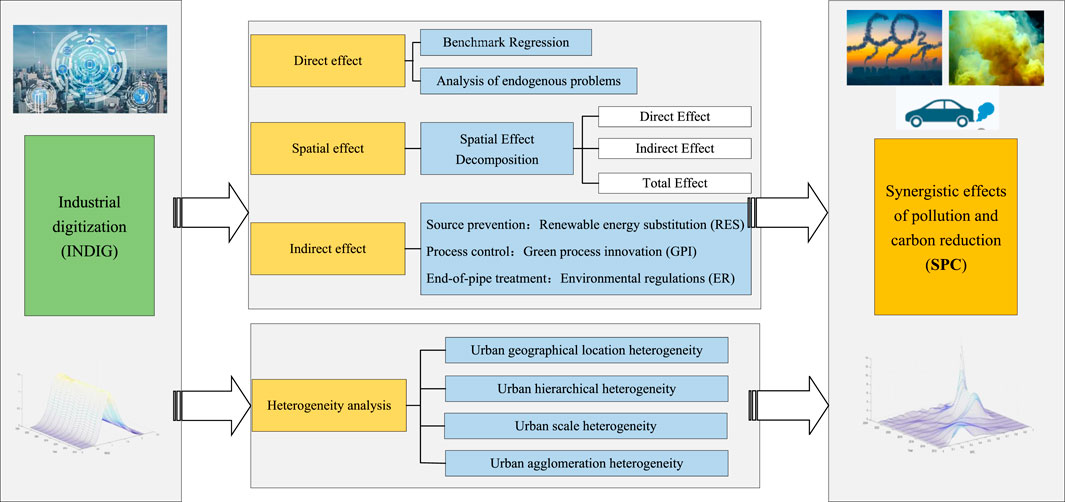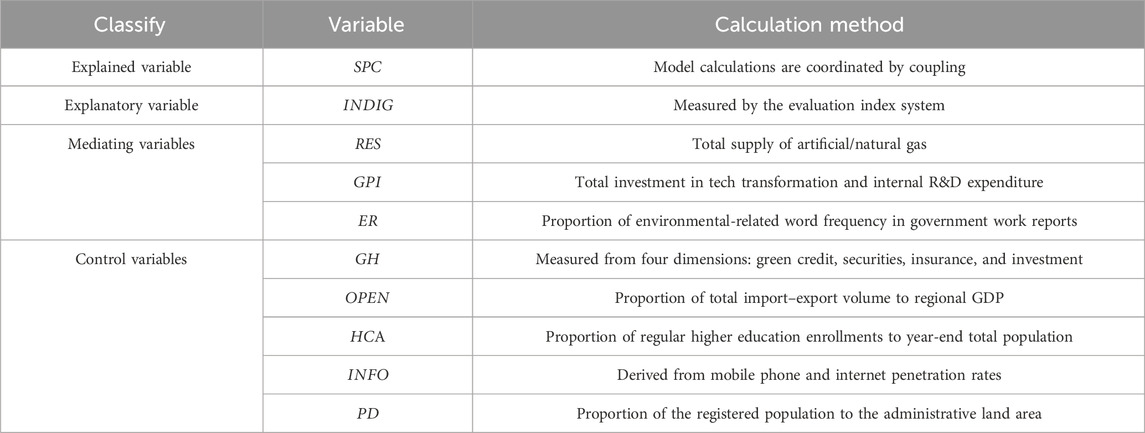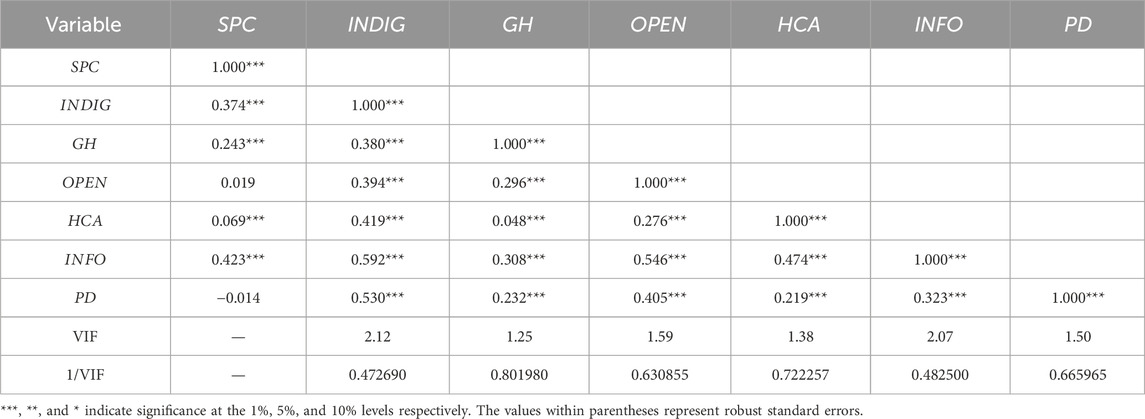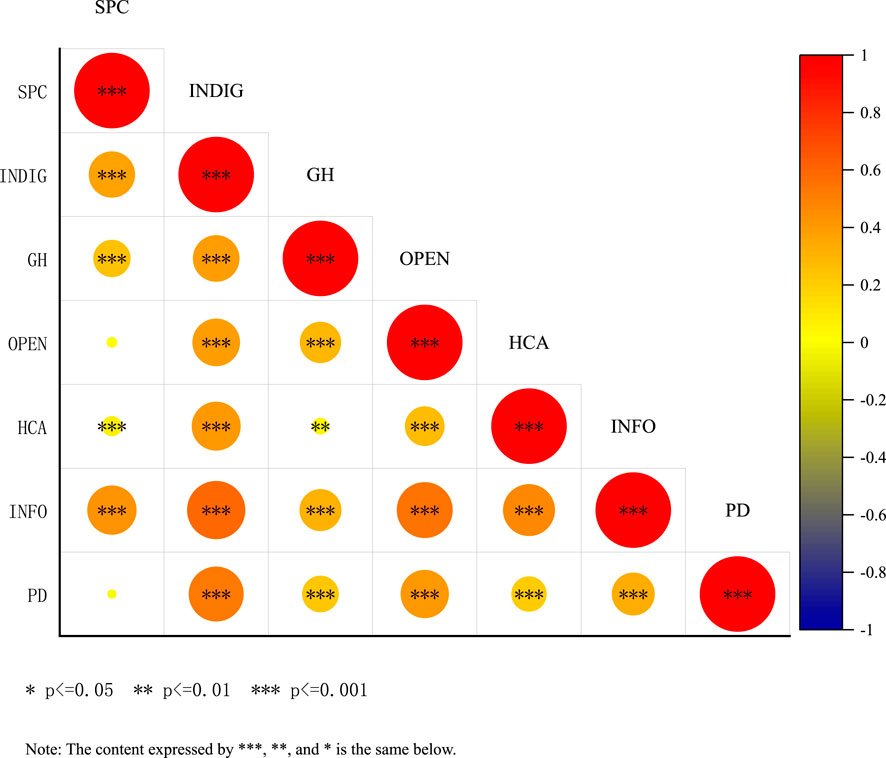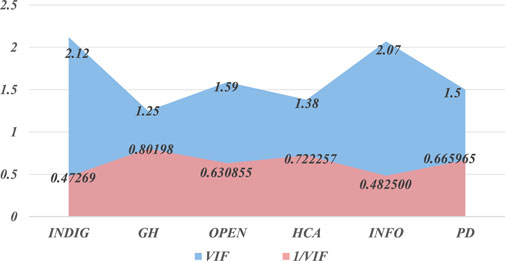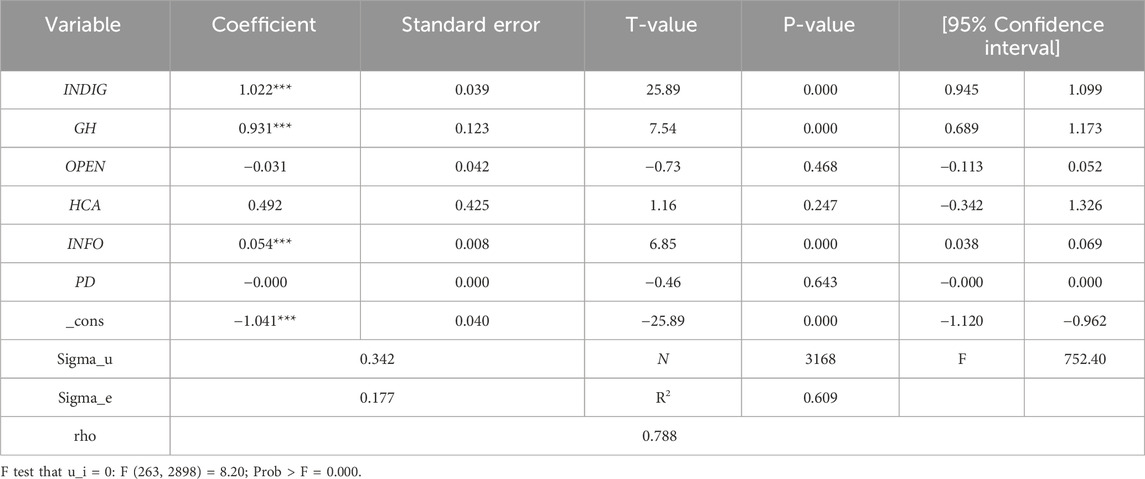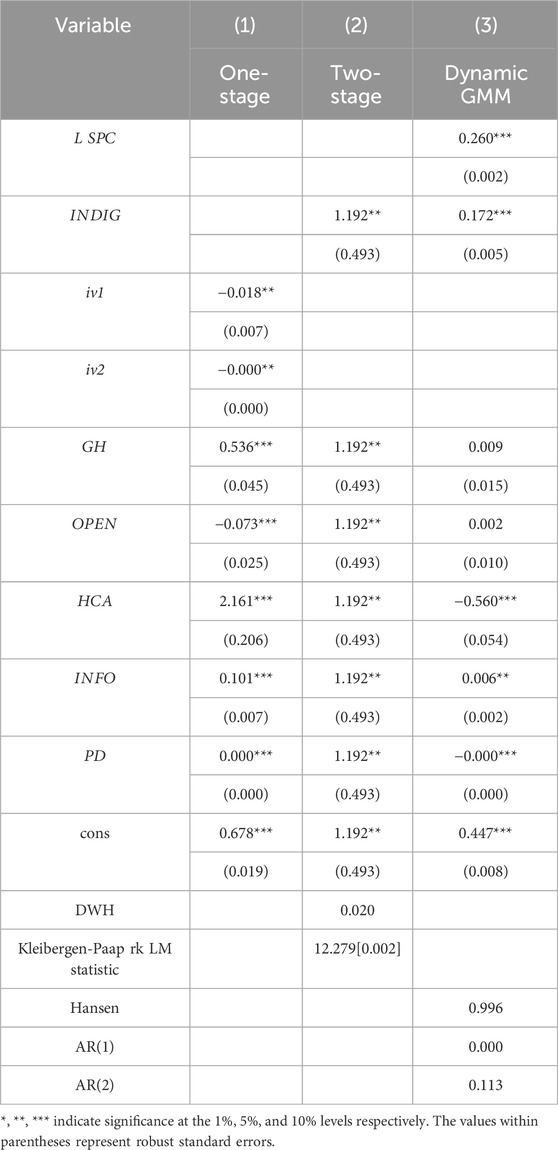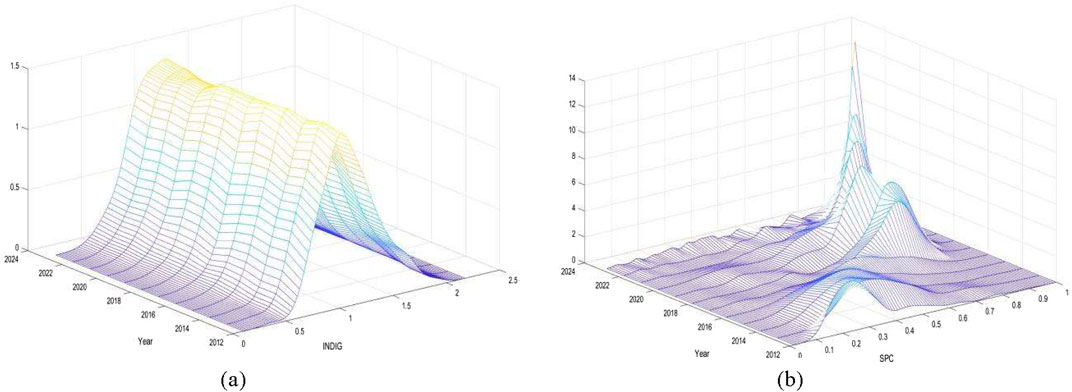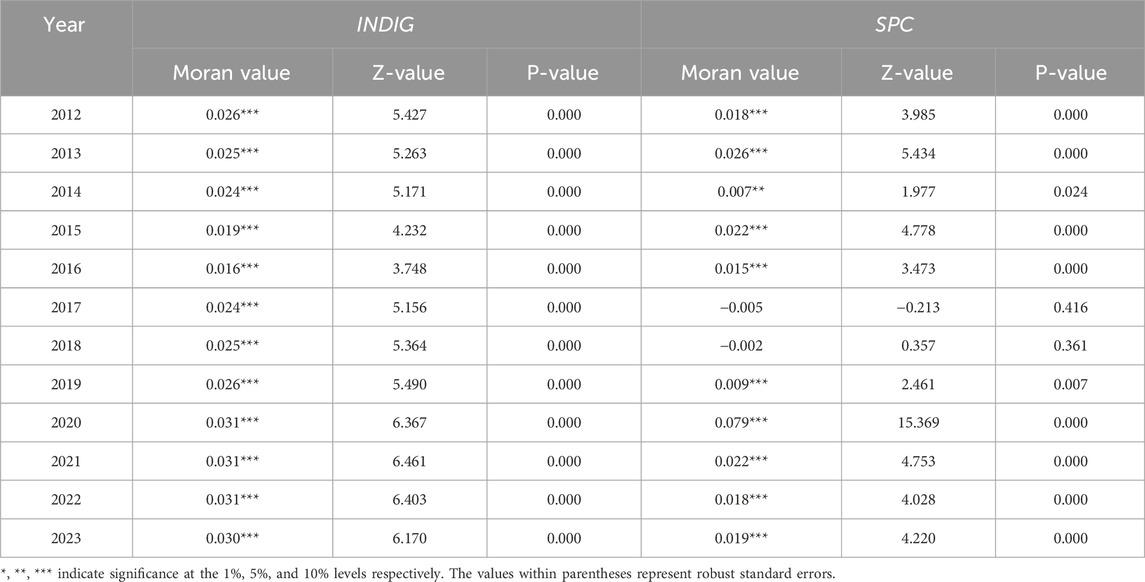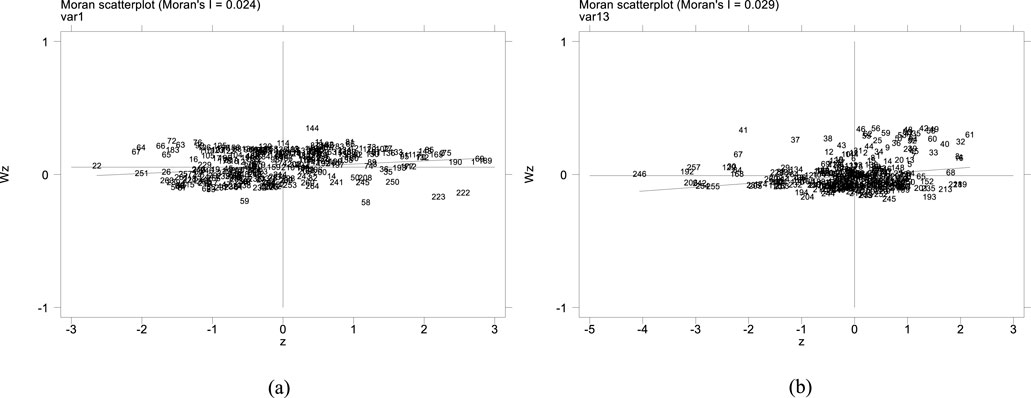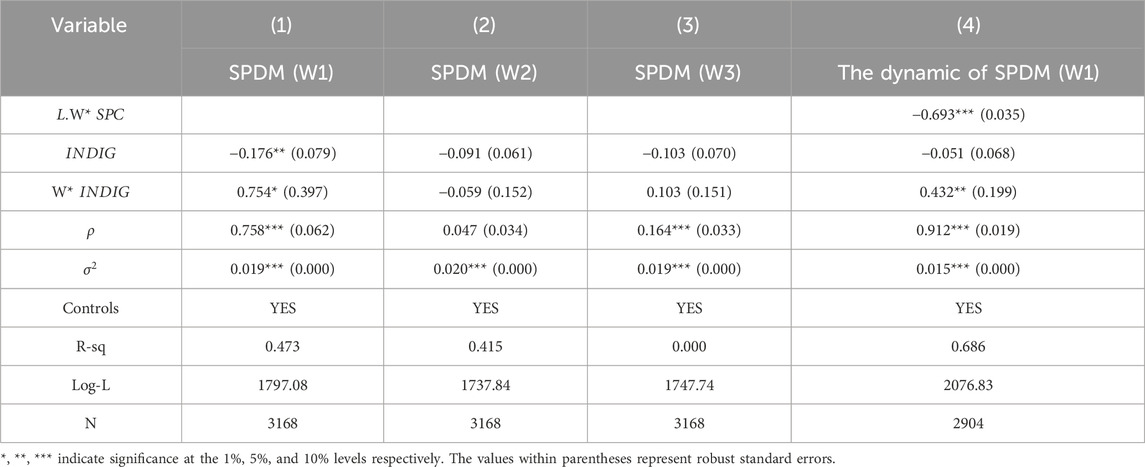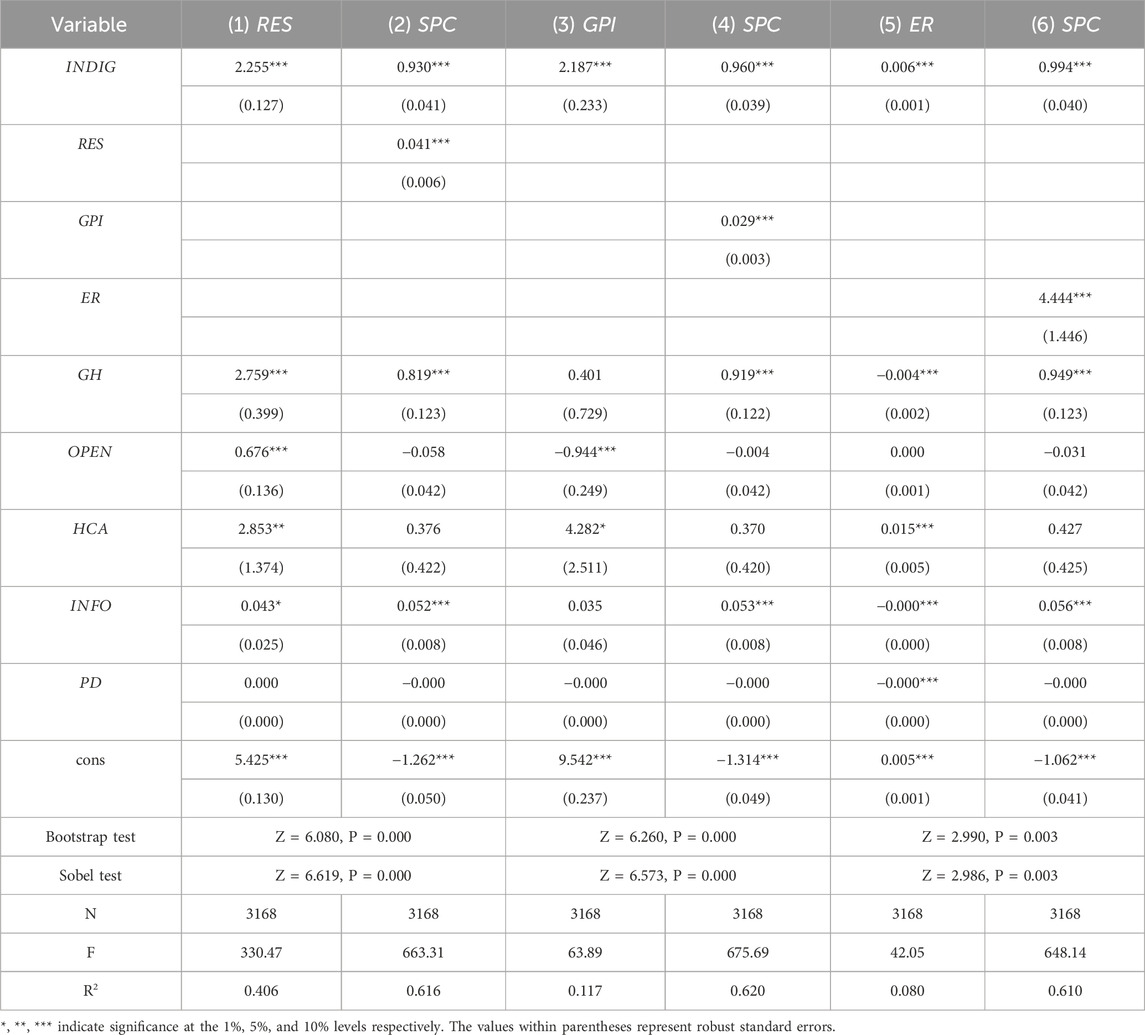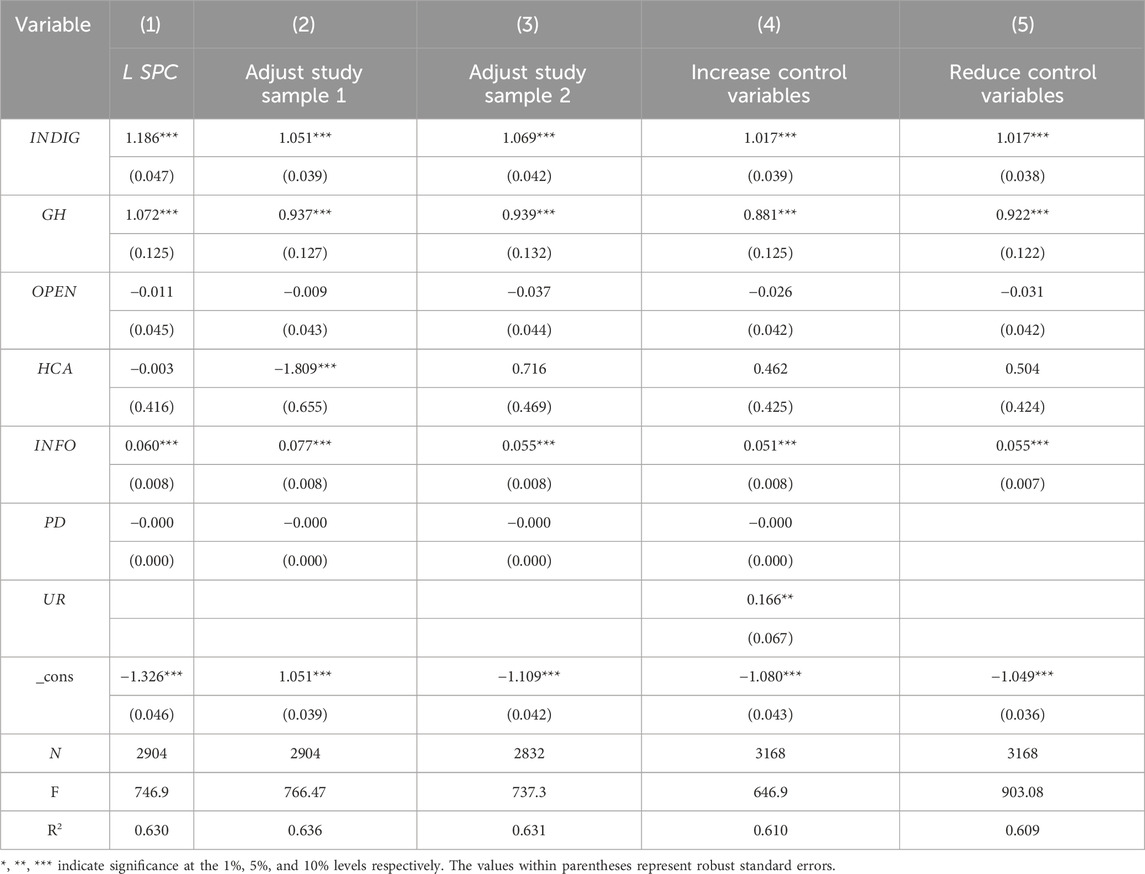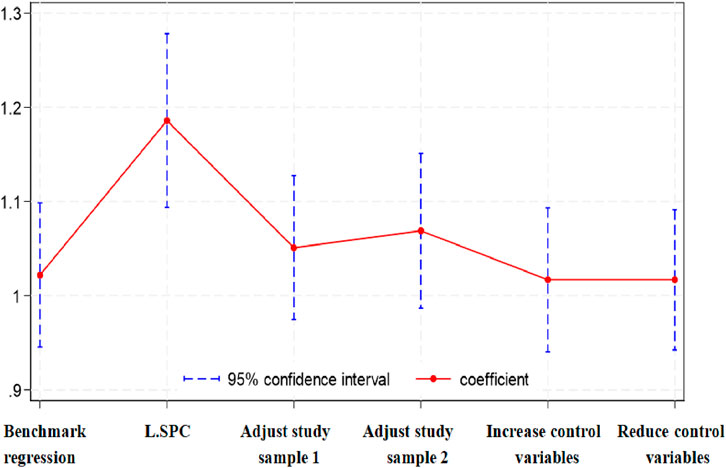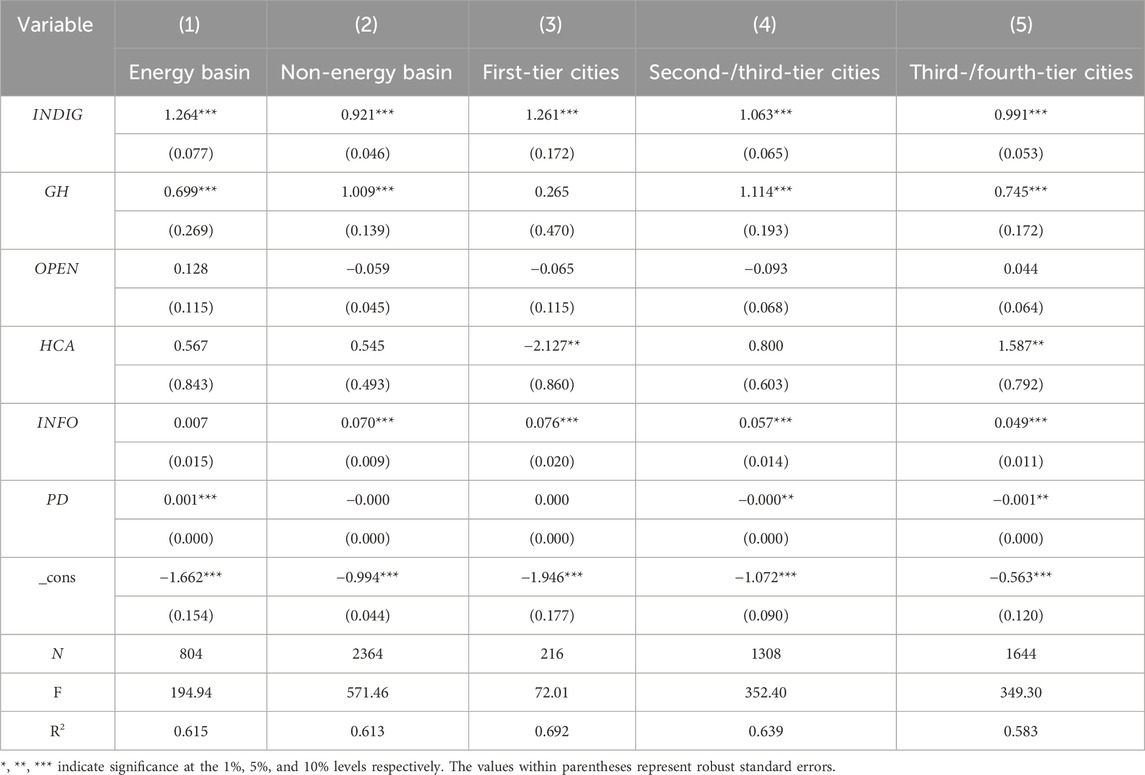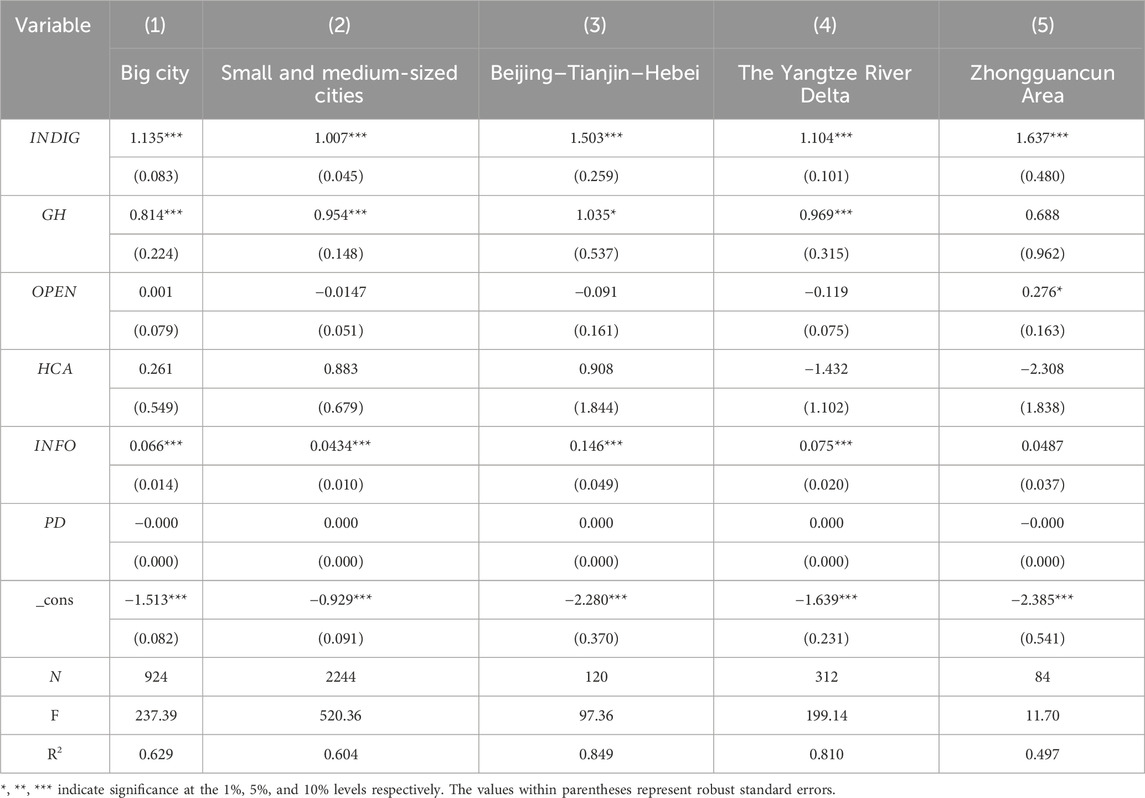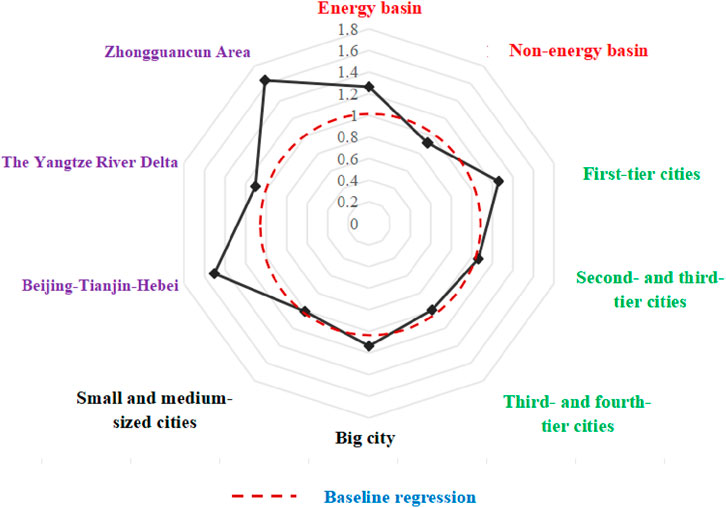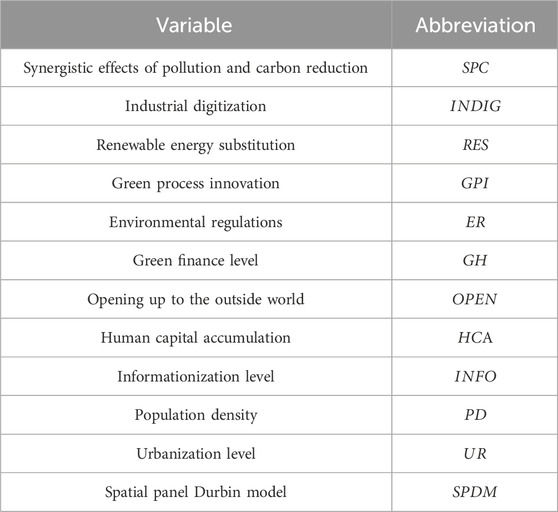1 Introduction
The report of the 20th National Congress, the 14th Five-Year Plan, and the Central Economic Work Conference was proposed to boost the synergistic effects of pollution and carbon reduction (). The essence of lies in the construction of a closed governance chain that links the whole process of “source--process--end-of-pipe”, and the “Pareto optimality” of pollution goals and carbon goals is achieved, which is the “Imperial sword” for building a “Beautiful China.” However, at this stage, China’s is still in the exploratory period, and there are governance difficulties, such as cracking of pollution and carbon policies, and governance models of “pollution first and then treatment”; the governance mode is “heavy Andover source” and fragmented (Yi et al., 2022). In addition, as a large developing industrialized country, China has long-term contradictions between economic development and environmental protection, and facing multiple pressures such as economic recovery, air quality standards, and the “dual carbon” goal, it needs to re-arrange the joint reduction work of pollution and carbon, break through the governance dilemma, and promote higher-quality development of as soon as possible.
The scale of industrial digitization () is 4.5 times that of digital industrialization, and due to its effects, plays a more vital role in . The proportion of in the digital economy has risen steadily, becoming an essential starting point for the digital economy to empower (Lyu et al., 2023). On 30 August 2023, General Secretary Xi Jinping highlighted at the National Eco-environment Protection Conference: “Deepen the application of digital technologies, build a beautiful digital governance system in China, and build a green and intelligent digital ecological civilization.” At present, China’s traditional industries urgently need to grasp the occasion of ; rely on abundant human and capital resources; give full play to the advantages of “integration”; quickly cover all links such as economic input, production, and sales; and inject a steady stream of impetus into the “joint governance” of regional pollution and carbon. So, what is the impact of on , and is there a spatial spillover effect? Which transmission mechanism of is affected by ? Under different transmission mechanisms, how does influence ? How to validly employ the indirect transmission mechanisms to improve ? These deserve to be explored. Based on the whole-process management and heterogeneity, the mechanism of on is deeply researched, offering empirical basis for governments to bridge the “digital divide” and improve in all aspects.
The potential marginal contributions are as follows: first, based on whole-process governance, it introduces renewable energy substitution (), green process innovation (), and environmental regulations () and employs a multiple mediating model to deeply probe the mechanism of how affects . This provides theoretical support for deepening the understanding of how the digital economy can enhance . Second, it depicts the spatial distribution of and and employs the spatial panel Durbin model () to test the spatial spillover effect of on to provide empirical support for local governments to coordinate the policies for the transformation of . Third, the study explored the multiple heterogeneous impacts of on , offering a reference for the government to enact and modify policies in a targeted manner.
2 Literature review
2.1 Research on INDIG
At present, the research on can be conducted from two dimensions: connotation and measurement methods. First, from the connotation of , Tapscott (1996) first put forward the term “digital economy.” The China Academy of Information and Communications Technology classified the digital economy into two major systems: digital industrialization (basic digital economy) and (integrated digital economy). This division has been widely accepted, and subsequent studies have further developed it on this basis. Some scholars have found that in regions with increased compared to digital industrialization, the “substitution effect” generated by the digital economy exceeds the “carbon-friendly effect,” which effectively reduces carbon (Yang et al., 2023). Other scholars have deemed that refers to the process in which new-generation digital technologies empower traditional industries, enabling the digital upgrading, transformation, and reconstruction of all factors of the industrial chain and promoting the whole-round and whole-chain transformation of (Lu et al., 2025; Wang et al., 2022). Second, regarding the macro-level measurement of , some scholars have constructed an evaluation system that includes indicators such as industry output value and capital factors, focusing on reflecting the depth of digital penetration from the industrial level (Lu et al., 2025). At the micro level, some scholars have adopted text analysis methods. Using Python technology, they extracted keywords from corporate annual reports within a digital thesaurus to construct an enterprise-level INDIG, which makes up for the deficiency that macro data cannot easily capture the behaviors of micro subjects (Lyu et al., 2023; Liu and Hong, 2022). It is worth noting that studies have mostly centered on the digital economy and its two subsystems: and digital industrialization, exploring the contribution of the digital economy to social and economic development. However, specialized measurements targeting remain scarce (Han D. R. et al., 2023; Zhang et al., 2025).
2.2 Research on the environmental governance effect of the digital economy
At present, the study on the effect of on still has no direct theoretical support, but the research on pollution and carbon control in the digital economy provides a reference. While the environmental consequences of the digital economy remain ambiguous (Ma et al., 2022), a growing number of studies affirm its positive role in environmental governance, especially its unique value in addressing the fragmented predicament of traditional environmental governance (Jiang et al., 2022). From the government, the issue of regulatory fragmentation in traditional environmental governance caused by departmental division and regional barriers can be effectively alleviated through use of digital technologies. The government has built a unified monitoring network using technologies to realize real-time sharing and dynamic tracking of cross-departmental and cross-regional pollution emission data, breaking down “data silos.” Meanwhile, supplemented by informal environmental regulatory methods such as online public participation (Liang and Li, 2023), it has constructed a collaborative governance pattern of “government-led and public-supervised.” By mitigating the efficiency losses arising from fragmented governance actors, the model markedly enhances the coherence and synergy of environmental governance. From the enterprise, digital technologies provide tool support for breaking the fragmentation of environmental governance in the industrial chain. Relying on digital technologies, enterprises have built a global database using “grid-based” and “three-dimensional” approaches (Yang et al., 2023), bridging the information gap between production links and environmental governance links. Furthermore, by establishing digital trading platforms, they accurately connect the demand for ecological products from the consumer side, promoting cross-regional and cross-subject supply–demand matching of regulatory service ecological products such as water rights and emission rights (Wang et al., 2025), thus effectively resolving the fragmentation problems in traditional governance, such as poor factor mobility and insufficient market synergy.
2.3 Research on SPC
IPCC first proposed the co-benefits of ecological and environmental governance (“co-benefits”), and its Fifth Assessment Report defined it as “positive side effects of policies or measures.” Academic research on the externality of pollution and carbon mainly focuses on four aspects: first, unilateral management of pollution and carbon, including the generation mechanism, hazards, and emission reduction measures of pollutants such as SO2 (Nazari et al., 2012), as well as CO2 emission reduction, carbon emission rebound, and carbon peak prediction (Jia et al., 2022). Second, theoretical research on focuses on the connotation, mechanism, and feasibility of collaborative governance. Some scholars have pointed out that pollution and carbon emissions in China share the same root cause due to fossil fuel combustion, and they evaluated , the synergistic pollution reduction effect of greenhouse gas governance, and the synergy degree between the two (Zhang Y et al., 2022; Qian et al., 2025). Third, the evaluation of the policies of . Scholars have taken China’s urban agglomerations or industrial parks as samples; constructed indicator systems from the aspects of pollutant emissions, environmental protection investment, and resource utilization efficiency (Liu and Hong, 2022; Li et al., 2025); and used methods such as the composite system synergy degree model and entropy-weighted TOPSIS (Behzadian et al., 2012) to assess synergistic benefits. However, conclusions are divergent due to differences in methods and indicators. Fourth, research on the driving paths of , focusing on “source prevention” (Sun and Deng, 2022), “end-of-pipe treatment” (Nam et al., 2013), etc. For example, Yi et al. (2022) proposed that “process control,” such as energy structure transformation, can promote synergistic efficiency.
In summary, the current research progress still has room: first, regarding research on , few studies have incorporated whole-process management on account of its essential requirements and constructed a multiple mediating effect model for empirical research. Second, among the existing limited research on the mechanism of influence between the digital economy and pollution, there are relatively few studies on . Few scholars have focused on the characteristics of or explored its spatial spillover effects. Third, existing studies have not fully incorporated multiple heterogeneous perspectives, such as regional and urban characteristics, making it hard to accurately identify the differential impacts of on .
3 Theoretical analysis and research hypotheses
3.1 Direct effect
As a subsystem of the digital economy, increases the output and improves efficiency of traditional industries employing digital technology and resources. Based on the concept of “integration,” the development of with “Dingxin” pulling “revolution” promotes the integrated development of smart agriculture, digital finance, and digital government (Tapscott, 1996), which not only improves regulatory transparency but also helps reduce resource loss caused by information asymmetry. From the perspective of externality theory, pollution emissions are a typical form of negative externality. improves regulatory transparency and reduces information asymmetry, which is essentially a process of internalizing negative externalities. It becomes more difficult for enterprises to hide pollution activities, and the government or society can hold them accountable at a lower cost, forcing enterprises to bear environmental costs. Meanwhile, this is also in line with the Coase theorem. reduces the transaction costs of defining environmental property rights (such as the division of pollution liabilities) through technical means, creating conditions for solving externality problems. “Metcalfe’s Law” believes that when enterprises add the investment in digital factors, it will decrease the marginal cost of products, achieve economies of scale, and increase benefits, and makes digital factors fully penetrate the industrial chain of traditional industries, adopt an intelligent production mode to improve the production efficiency, provide conditions suitable for clean production of enterprises, and exert environmental welfare effects (Ma et al., 2022). In terms of the market, has broken the business model of traditional industries, created a disruptive innovation model, spawned new business formats, and opened up many market segments. Based on the theories of economies of scale and by leveraging the advantages of digital platforms, the “scale effect” in resource allocation can be achieved through measures such as reducing transportation, thereby reducing pollution emissions (Liu and Hong, 2022). In terms of green production, due to the abundant capital and resources of traditional industries, can more quickly and extensively open up the upstream and downstream industrial chain, quickly integrate digital technology, improve production efficiency and cleanliness overall, and achieve sustainable development of green production, compared with the green influence of digital industrialization, while improving economic benefits and promoting the sustainable development of enterprises through green production (Zhao and Meng, 2022).
Hypothesis 1. can promote .
3.2 Spatial effect
Compared with pollution types with clear boundaries such as soil and water, pollutants and carbon emissions have the characteristics of mobility and spillover, and atmospheric pollutants and greenhouse gases generated in a certain area are easily diffused and spilled over to adjacent areas due to the presence of atmospheric circulation so that atmospheric pollution carbon presents regional characteristics (Zhang Y. H. et al., 2022). Digitalization has the characteristics of permeability and sharing. Based on knowledge spillover theory, in the digital network, knowledge, technology, information, and other key elements can break space and industry barriers; achieve cross-regional flow, form “mobile space” and “mobile industry”; and radiate to drive the development of adjacent regions. Based on the spatial interconnectedness of regional and social development, digitally transformed industries have a spatial effect on regional green development through technology and information spillover across spatial constraints (Jia et al., 2022), such as digital government. The “trickle-down effect” theory holds that any development is driven by local outward radiation to drive overall development; fully penetrates all fields of the society, strengthens regional cooperation, promotes multi-subject joint participation, realizes cross-regional collaborative governance, reduces negative environmental externalities, and exert a decisive influence on the greening of social production (Huang et al., 2022). On the one hand, information elements can boost the digital and intelligent transformation of environmental management, establish a database for rapid and accurate monitoring, and adopt a differentiated management method of “one source and one file” to achieve the integration of “sky, ground and sea.” On the other hand, the flow of technical elements promotes exchanges and learning flow between neighboring regions and other industries, improves the overall green innovation ability, and technologies such as big data help collect accurate information on regional green innovation capabilities, help identify substantive and strategic green innovation, and effectively improve green progress in neighboring regions (Han et al., 2022), thereby promoting .
Hypothesis 2. has a positive spatial spillover impact on in neighboring regions.
3.3 Indirect effect
The whole-process governance system is built based on the cleaner production theory. The vital requirement of is to boost the transformation of the end governance model of “pollution first, treatment later” to the whole-process governance model. To break the dilemma of “pollution first, then treatment” and “emphasis on the end over the source,” this paper probes the path of from the three links of whole-process governance. First, coal combustion releases large amounts of greenhouse gases and atmospheric pollutants. By replacing high-carbon and high-pollution energy sources (such as coal), can prevent the source of pollution and carbon emissions at the energy input end, which serves as the core means of “source prevention” (Liu et al., 2021). Second, under the realistic constraints of production costs, although requires more resource input in the short term, it can effectively curb the disorderly consumption of energy and reduce unit energy consumption through the iterative upgrading of production equipment and systematic reconstruction of processes, thereby improving production efficiency and output scale. From a long-term perspective, such innovation can not only gradually offset various costs required for environmental governance but also directly reduce pollution generation during manufacturing, thus achieving “process control” over atmospheric pollutants and carbon emissions (Wang et al., 2016). Finally, the “Porter Hypothesis” proposes that there is a close correlation between and corporate innovation. Its core “innovation compensation” effect not only promotes enterprises to reduce pollution and carbon during manufacturing through technological improvement but also urges enterprises to improve their secondary treatment capacity for the generated pollution and carbon. As the last guarantee for environmental governance, this post-processing mechanism belongs to the “end-of-pipe treatment” link (Fare et al., 2016). In addition, can improve the efficiency of , while can reduce the pressure of end-of-pipe treatment and make more likely to be implemented. These three factors form a governance closed loop through the dynamic coordination of “source prevention—process control—end-of-pipe treatment.” Therefore, research centers on analyzing the mediating roles of , , and in the path of ’s impact on .
3.3.1 Analysis on the mediating role of RES
From enterprise production, promotes innovation of traditional industrial structures and models. According to the energy substitution theory (core logic: when the cost–benefit ratio of clean energy improves, it will replace high-carbon energy as the dominant energy for production), the in-depth digital integration of the industrial chain has promoted : in traditional industrial production, the demand for traditional industrial raw materials has decreased, while the demand for clean energy such as electricity has increased. Existing studies have shown that the digital economy can promote by curbing the total energy consumption (Zhang S et al., 2022). Meanwhile, services such as intelligent decision-making and analysis on digital platforms have reduced information and R&D costs, facilitating the precise development and application of new clean energy. Although the short-term investment is relatively high, the long-term green benefits are more remarkable (Shahbaz et al., 2022a). From the public perspective, digital platforms reduce the difficulty of resource acquisition, and competition among suppliers lowers energy prices, which may stimulate consumption and produce a “rebound effect”; However, creates diverse job opportunities to increase per capita income, and the increase in income makes it easier for the public to choose clean energy (Wang and Cao, 2019). To sum up, promotes by reducing the demand for traditional energy and developing clean energy and ultimately contributes to .
Hypothesis 3a. promotes by advancing .
3.3.2 Analysis on the mediating role of GPI
focuses on technical optimization during manufacturing, which can validly alleviate the contradiction between economy and ecology and offer technical support for the synergy between the digital and green economy during manufacturing. The theory of technological innovation and the theory of endogenous economic growth propose that technological innovation is a valid element for high-quality economic progress (Zhao and Meng, 2022). On the one side, accelerates the cross-regional flow of innovation factors by opening up the innovation system, forcing policy innovation to create an open innovation environment, helping break the “resource curse” and improving the level of ; the intelligent transformation of enterprise production equipment and processes through green technologies can promote the clean transformation of energy (Cao et al., 2021), thereby promoting . On the other side, can boost factor collaboration and production efficiency, increase output and reduce energy consumption under the same input, and promote resource recycling and pollution and carbon emission reduction; meanwhile, with the help of pollution data collection and the construction of dynamic monitoring and early warning platforms, production strategies can be supervised and adjusted on time (Feng et al., 2022), stimulating “smart potential” for emission reduction and having a positive impact on .
Hypothesis 3b. promotes by improving .
3.3.3 Analysis on the mediating role of ER
relies on digital technologies to strengthen the effectiveness of through information sharing and real-time monitoring, providing institutional guarantees for . This process can be explained by the Porter Hypothesis: appropriate can incentivize corporate innovation, and makes regulation more precise and effective through technological empowerment, amplifying the “innovation compensation” effect (Fare et al., 2016). At this stage, China mainly adopts incentive-based and public-participation (Liang and Li, 2023), and both have enhanced effectiveness due to the in-depth integration of . In incentive-based regulation, digital technologies improve the measurement accuracy and market transparency of carbon emission rights and energy use rights trading, dynamically adjust quotas through intelligent algorithms, make corporate emission costs measurable and controllable, and force enterprises that have not achieved green transformation to withdraw from the market through a “survival of the fittest” mechanism (Sun and Deng, 2022). In public-participation regulation, digital platforms break down information barriers, enabling the public to easily access enterprise pollution discharge data and participate in supervision, which prompts enterprises to accelerate green transformation through digital means and take the initiative to invest in end-of-pipe treatment (Han X. F. et al., 2023).
Hypothesis 3c. promotes by strengthening .
The research frame diagram of this paper is constructed, see Figure 1.
4 Measurement methods and data sources
4.1 Model building
First, the benchmark regression model is used to explore the direct effect of on , see Equation 1.
where: means the city, means the year, represents the control variables, including green finance level (), opening up to the outside world (), human capital accumulation (), informationization level (), and population density (). is a constant term; represents regression coefficients; and , respectively, represent individual-fixed and time-fixed effects; and is a random perturbation term.
Second, referring to Elhorst (2010), the research employs to probe the spatial spillover impact of on in neighboring regions, see Equation 2.
where is the constant, and represent the city, is the spatial weight matrix of order 264 × 264, is the spatial autoregressive coefficient, and represent the regression coefficients of each variable, and represent the regression coefficients of the spatial lag term of each variable.
The spatial weights matrix: . A geographical distance spatial weight matrix is used, and explanatory power is not impacted by the sample size (Feng et al., 2021). calculates the Euclidean distance between the centroid of city and city according to the latitude and longitude, see Equation 3.
Finally, this paper introduces three types of mediating variables: , , and , and the multiple mediating effect model is used to research the indirect influence mechanism of on , see Equations 4, 5.
where, and are constant terms and represent the regression coefficient ().
4.2 Variable measurement and description
4.2.1 Variable measures
1. Explained variable: . The issues with reduction of air pollution and greenhouse gas are key to China’s current environmental governance, and the two generation processes have the same origin, course, and influence on each other (Zhang J et al., 2022; Sun and Deng, 2022), and is feasible. We selected the emission of sulfur dioxide, soot, and wastewater to measure pollution reduction. CO2 emissions are selected to represent carbon reduction. Drawing on the practice of Hu (2023), the coupling coordination model is used. The range standardization method is used to process the index dimensionless, and the model is modified by referring Wang et al. (2021), see Equations 6–8.
Among them, is pollutant emissions, is carbon emissions, and and represent the proportion of gravity, taking . is measured as a coupling-coordination index bounded between 0 and 1; the larger the value, the better the coupling state between the two, and vice versa, the weaker.
2. Explanatory variable: . Referring to Zhang S et al. (2022), from the three dimensions of primary industry, secondary industry, and tertiary industry, the Indicator of is measured using the projection pursuit method based on the real-coded accelerated genetic algorithm. Specifically, the indicators for the primary industry include the number of internet broadband access users and the added value of the primary industry; the indicator for the secondary industry includes the added value of the secondary industry; the indicators for the tertiary industry include e-commerce transaction volume, digital inclusive finance index, and the added value of the tertiary industry.
3. Mediating variables: Different from the traditional model of governance in a certain link, research explores the transmission path of in the affected areas of based on the whole-process management of “source--process--end-of-pipe.”
Source prevention is a preventive environmental management strategy (Liu et al., 2021). China’s environmental governance has focused on end-of-pipe and over-the-source, which, to a certain extent, has led to slow and industry structure adjustment in high-carbon and high-energy-consuming industries, slowing down the governance process. Promoting the clean transformation of energy and minimizing pollution at the source, we refer to Shahbaz et al. (2022b) to denote .
Process control is based on the source prevention that has not been fully realized. Further treatment of pollutant sources that raise resource utilization and production efficiency effectively reduces pollutant generation, creating a subtractive effect on emissions and reinforcing pollution control. GPI reduces pollution through methods such as production process reengineering and equipment renewal. We refer to Feng et al. (2022) to denote GPI.
End-of-pipe treatment is a complement to the association between process and source, which refers to taking advantage of high and new technology to clean the air pollutants and greenhouse gases that have been produced at the end of product production to meet emission standards, which is a “first pollution and then treatment” model of emission reduction, which is hard to remove pollutants and is a “palliative” behavior. Due to the “competitive tournament” system, government officials are limited by the tenure rule and prefer to adopt investment methods to deal with air pollution at the end of the treatment and to quickly achieve the constraint goal of pollution carbon emission reduction; we refer to Chen and Chen (2018) to denote .
4. Control variables: will be affected by internal and external factors in addition to . Drawing on existing studies, the control variables are selected: (1) . Green finance is an essential part of the economic system and promotes , referring to Cao et al. (2021) to denote . (2) . Openness determines the flow of factors, thereby affecting resource consumption and green technology innovation, which is an important factor affecting , referring to Wang et al. (2019) to measure . (3) . Human capital is the main body of technological innovation and a vital factor affecting sustainable development, referring to Lin et al. (2021) to measure . (4) . The informatization process promotes technological progress, optimal allocation of resources, industrial structure optimization, etc., forming the “energy factor substitution effect”, which is an important way to reduce energy consumption and improve , referring to Wu and Deng (2023) and Rao (2025) to measure . (5) . is strongly correlated with energy consumption and green development, and it is an important focus in the research on . It is denoted concerning Ribeiro et al. (2019).
4.2.2 Data sources and descriptions
Considering the availability of data and avoiding the estimation bias caused by data omission, the panel data of 264 cities in China from 2012 to 2023 were selected as the research object, and the data were derived from China City Statistical Yearbook, the website of the National Bureau of Statistics, and the statistical yearbooks of various provinces and public information. The linear interpolation and logarithmic methods are used. Tables 1, 2 show that there are no outliers in all variables, and the mean VIF is 1.65, showing that the possibility of multilinearity between the explanatory variables is not serious. To further enhance the visibility of the results, additional figures, Figures 2, 3, have been added.
5 Empirical results and analysis
5.1 Benchmark regression
After the Hausman test, a fixed-effects model is selected (see Table 3). The effect coefficient of on is remarkably optimistic, showing that can help boost and test H1, referring to Yang et al. (2023). From a control variable perspective, promotes at the 1% significance level. By guiding social capital to tilt toward fields, clean energy, and R&D of carbon emission reduction technologies, green finance provides financial support for enterprises’ green production transformation and regional ecological governance projects, thereby promoting (Lin et al., 2021). The effect coefficient of on is very optimistic at the 1% level. With the help of technologies, real-time tracking of enterprise pollution discharge and energy consumption data can be realized, timely early warning of excessive behaviors and rapid traceability can be carried out, and dynamic control and management of pollution and carbon emissions can be strengthened, which is conducive to the implementation of work of (Ribeiro et al., 2019).
5.2 Endogenous problem analysis
Starting from the research theme, it is very likely that there may be a certain causal endogenous relationship between and . Although , , , , and have been included as control variables to solve the endogenous problem of missing variables, there are many factors affecting , and use of a regression model makes it hard to contain all factors, and the problem of missing variables is produced.
The DWH test method of heteroscedasticity is used, which solves the problem that the Hausman test cannot solve the heteroscedasticity, and obtains a statistic of 5.398 and a P-value of 0.020, showing that the index in the model has endogenous problems. To reduce the existing endogenous problem, the instrumental variable method is used to alleviate the endogenous problem, drawing on the methods of Chen et al. (2022) and Huang et al. (2019), taking the topographic undulation (iv1) and Interaction term between 1984 provincial post offices per hundred people and prior-year national internet users (iv2) as the tool variables of , see Table 4.
The p-value of the LM statistic is 0.002, indicating that there is no under-identification. Instrumental variables are remarkably relevant to , thus verifying their validation. The coefficients of are remarkably positive, showing that the conclusion of the research still holds after alleviating the endogenous problem. From the system GMM model’s results, the feasibility of the system GMM model is verified by AR, Hansen, and other tests, and compared with the traditional model; this model underestimates the promotion impact of on . Both models show that has a remarkably positive impact on , which further confirms H1.
5.3 Spatial effect test
5.3.1 Initial exploration
The three-dimensional nuclear density map of and from 2012 to 2023 is drawn, and its temporal evolution trend and spatial distribution are observed, as shown in Figure 4. From (a), the graph presents the characteristics of “single peak dominance, peak elevation, and distribution convergence.” The single peak stems from policy inclusiveness and low technology reuse costs, which promote synchronous digital transformation in all regions and avoid regional polarization. The peak growth reflects the advancement of from a production auxiliary to a core link. The distribution convergence indicates that the gap in between regions has narrowed. From (b), the phenomenon of “coexistence of multiple peaks and right shift of the main peak” appears. Multiple peaks indicate that is not very stable, being in a state of constant fluctuation with regional differences. The right shift of the main peak shows that, despite large intra-regional differences, has gradually strengthened over time.
5.3.2 Exploratory spatial data analysis
The spatial correlation test of the research objects is conducted using global Moran’s I, as shown in Table 5; Figure 5. Both and exhibit a remarkable positive spatial correlation, with stable changes in their spatial correlation characteristics. This indicates a positive connection between local and adjacent regions, meaning that the improvement of and in one region helps drive up the corresponding indicator levels in neighboring regions. Moreover, over time, the connections between various regions remain relatively stable, and their spatial agglomeration and dependence degree will not weaken accordingly.
5.3.3 Spatial spillover effect
The above model verifies the remarkable positive impact of on , but it does not consider the mutual influence between regions. Therefore, is adopted for further research. After LM, Wald, LR, and Hausman tests, this paper finally selects the SPDM of space-time dual fixed spatial panel to analyze the spatial spillover effects of on , see Tables 6, 7. Column (1) of Table 6 shows that the impact coefficient of the interaction term W* on is remarkably positive.
To fully verify the rationality of the selection of spatial weight matrices, economic distance matrices and economic–geographical nested matrices are further used for empirical tests; see columns (2)–(3) of Table 6. The results show that the impact coefficient of on is not remarkable. This may be because the spatial logic of is more dependent on the governance convenience and pollution diffusion characteristics brought about by geographical proximity, while economic distance matrices and economic–geographical nested matrices have a weak correlation with this logic, which ultimately leads to the insignificant impact coefficient.
Robustness test. According to column (4) of Tables 6, 7, to mitigate endogeneity issues, this paper further adopts the dynamic of for testing. The results show that the spatial lag term of is remarkable. The intra-regional spillover effect of on is not remarkable, but there exists a strong inter-regional spillover effect, and the long-term spillover impact of is significantly greater than the short-term one. Its economic logic can be further elaborated by combining the characteristics of regional factor flows and the research by Ren et al. (2023): regarding the insignificant intra-regional spillover, on the one hand, it stems from the “polarization effect” in the core regions of : factors of technology and capital agglomerate in regions with marked digitalization, making it difficult to effectively diffuse to surrounding areas within the same region in the short term. In contrast, the high energy-consuming nature of the digital industry itself leads to an increase in local pollution and carbon, while measures of emission reduction, such as energy structure optimization and green innovation, have a time lag in taking effect. The reallocation of factors within the region has not yet formed sufficient compensation for green benefits, so no remarkable intra-regional spillover has been observed. In terms of the long-term and short-term differences in inter-regional spillover, the short-term effect mainly arises from the rapid cross-regional diffusion of digital technologies and the real-time flow of information factors. forms a demonstration effect through technology promotion and model innovation, forcing enterprises in the surrounding regions to participate in by introducing technologies or conducting independent innovation. This process quickly manifests itself, relying on the high mobility of digital factors. The strengthening of the long-term effect is closely related to the continuous cross-regional allocation of factors such as capital and talent. With the increase in , the optimal reorganization of factors across regions becomes more adequate, promoting the gradual formation of a long-term mechanism for collaborative emission reduction, thus producing remarkable long-term spillover effects. Compared with the results of the static of , the dynamic of is not an obvious change in regression, showing that the model is robust and verifying H2.
5.4 Mechanism analysis
Based on the above results, the mediating mechanism of how affects is further tested, see Table 8. From whole-process management, under the impacts of , and , has an indirect impact on in China to a certain extent, and H3a, H3b, and H3c have been confirmed.
Columns (1) and (2) present the test results with as the mediating variable. Under the influence of , has a partial mediating effect on . For every 1-unit change in , will increase by 2.255 units, which in turn exerts an indirect effect of 0.092 (2.255*0.041) on . This result is supported by Lin et al. (2021) and Ren et al. (2023), demonstrating that can reduce the technical threshold and cost of through smart grid dispatching and digital twin simulation, enhance , and reduce pollutants and carbon emissions from fossil energy combustion at the energy input stage.
Columns (3) and (4) present the test results with as the mediating variable. has a remarkable optimistic effect on , with an impact coefficient of 2.187, while significantly promotes , with an impact coefficient of 0.029. The product of the two regression coefficients is significantly positive, indicating that exerts an optimistic impact on by promoting , with an impact coefficient of 0.960. This conclusion is supported by Feng et al. (2022), which states that effectively improves , thereby indirectly promoting .
Columns (5) and (6) report the test results with as the mediating variable. When other factors remain unchanged, every 1-unit change in will promote an increase of 0.006 units in ; every 1-unit increase in will significantly drive up by 4.444 units. That is, indirectly promotes through the mediating role of enhancing , with a total impact coefficient of 0.994. This result is evidence in Han X. F. et al. (2023), which indicates that is a mediating mechanism through which affects .
Overall, the positive indirect impact of on runs through the entire governance chain of “source--process--end-of-pipe”: through , it reduces reliance on fossil energy and the generation of pollutants from the source of energy consumption; relying on , it strengthens energy efficiency improvement and pollution control during manufacturing; and through the transmission of , it forces technological upgrading and collaborative emission reduction at the end of governance. These three paths confirm that not only affects through direct spillover effects but also constructs a collaborative mechanism of “prevention-control-treatment” through the whole-process transmission of “source - process - end.” This transition facilitates evolution from isolated process improvements to holistic system upgrades, while simultaneously enhancing the systematic coordination of regional eco-environmental governance through digital enablement.
5.5 Robustness test
The robustness of the results is further verified, see Table 9: addressing endogeneity issues, adjusting research samples, and modifying control variables: first, addressing endogeneity issues. This paper employs a dynamic panel regression model, selecting the t-1 lagged term of as the explained variable. The results in column (1) are like the above results, indicating model robustness; second, adjusting research samples. ① To resolve the problem of right-censored samples, this paper excludes relevant data for 2023. The results of Column (2) show no remarkable differences from the previous test results, demonstrating the robustness of the empirical findings. ② Samples from regions with the largest and smallest 1%, 5%, and 10% of are sequentially removed, and benchmark regression tests are conducted on 258, 236, and 210 cities, respectively. The results of in column (3) are similar to the previous results with no obvious differences (due to space constraints, only the empirical results for 236 cities are presented in this paper). Third, modifying control variables. ① Adding control variables. Urbanization level () in China is highly correlated with , and it is also a a factor influencing . Therefore, is increased as a control variable, measured by the proportion of non-agricultural population in the registered population (Nam et al., 2013), as shown in column (4). ② Reducing control variables by excluding , see column (5). The results obtained by adding or reducing control variables are similar to the above results, showing the robustness of the findings in this paper.
Figure 6 is provided to more clearly present the robustness test results and their differences from the benchmark regression results.
6 Heterogeneity analysis
6.1 Urban geographical location heterogeneity
To further explore the heterogeneous impact of on , the sample is divided into two regions, energy basin and non-energy basin, as shown in columns (1)–(2) of Table 10. has significantly promoted in energy basins, and the impact coefficient and significance are higher than those of non-energy basins. The rationale stems from the energy basin’s dual role as both a critical ecological barrier and a key economic zone in China. As government recognition of the basin’s strategic importance has grown, so has policy attention. This enhanced focus manifests in two ways: on the one hand, enterprises are more likely to grasp the chance of digitization to carry out the clean transformation, and on the other hand, the government and individuals rely on digital platforms to dynamically monitor environmental pollution and governance and implement stricter than other regions; the “pollution shelter” hypothesis considers that polluting corporations are easier to be transferred to other regions. In contrast, non-energy basins experience weaker governmental oversight and support. These regions additionally suffer from negative environmental externalities resulting from the transfer of polluting industries from energy basins.
6.2 Urban hierarchical heterogeneity
Further analysis is conducted on the effect of urban hierarchy on . Referring to Yu et al. (2021), the samples are divided into three categories: first-tier cities, second/third-tier cities, and fourth/fifth-tier cities for research, see columns (3)–(5) of Table 10. remarkably promotes , but the impact coefficients follow the order: first/second/third-tier cities > fourth/fifth-tier cities. The reason may be that first-/second-/third-tier cities have more complete digital infrastructure, with stronger support from 5G, industrial internet, etc., enabling real-time monitoring and regulation of pollution discharge. In addition, these cities have more high-end industries, providing a sound foundation and greater space for digital transformation. In contrast, fourth-/fifth-tier cities are dominated by traditional industries, which face higher costs and greater difficulties in transformation.
6.3 Urban scale heterogeneity
Further investigation is made into the impact of urban scale on the effect of . For samples of different urban scales, we examine whether there are differences in the impact of on . By the Notice on Adjusting the Standards for Classifying Urban Scales published by the State Council, cities are classified as follows: large cities (with a permanent population of more than 1 million) and small and medium-sized cities (less than 1 million), see columns (1)–(2) of Table 11. The results show that significantly promotes in large cities, with a higher impact coefficient compared to small cities. The reason lies in that large cities have greater superiority in terms of resource endowment, industrial foundation, technical support, and policy coordination, which form a more efficient match with the technical characteristics of and the implementation conditions for . Conversely, small and medium-sized cities have a lag in digital infrastructure, and some traditional industries have not even completed the intelligent transformation of basic equipment, making it difficult for to be implemented, and thus is naturally limited.
6.4 Urban agglomeration heterogeneity
Further examination is conducted on the impact of urban agglomerations on the effect of . The influences of on in the Beijing–Tianjin–Hebei, Yangtze River Delta, and Pearl River Delta urban agglomerations are tested, respectively, see columns (3)–(4) of Table 11. The impact coefficients of on SPC in these three urban agglomerations are larger than those of the full sample. The reason may be that industrial connections within urban agglomerations are close, enabling digital technologies to spread rapidly along the industrial chain and realize cross-regional collaborative governance of energy consumption and pollution. In addition, these areas are rich in innovative resources, facilitating faster R&D and application of digital technologies, and are supported by national collaborative policies, which reduce coordination costs.
To present the heterogeneity analysis results of concerning more clearly and to highlight the differences between these results and the previous results, the effect coefficients of on are summarized (see in Figure 7).
7 Main conclusions and implications
7.1 Main conclusions
1. has exerted a remarkable positive effect on . The instrumental variables are introduced, and the robustness tests are conducted. The conclusion is still robust.
2. Through exploratory spatial data analysis, the spatial correlation between and is remarkably optimistic. has obvious spatial spillover characteristics for , and the inter-regional spillover effect is strong, and the long-term spillover effect of is significantly greater than that of the short term.
3. Based on whole-process governance, explore the mechanism of on . It can be found that has different degrees of indirect impact on , which is manifested in indirectly promoting by improving of “source prevention,” by improving “process control,” and strengthening of “end-of-pipe treatment.”
4. In terms of the heterogeneity of urban geographical locations, it is found that compared with non-energy basins, has a greater impact on in energy basins. In terms of urban hierarchy heterogeneity, plays a more vital role in boosting in first-, second-, and third-tier cities. In terms of urban scale heterogeneity, has a more remarkable promoting impact on in large cities. Regarding urban agglomeration heterogeneity, exerts a more remarkable promoting effect on in urban agglomerations.
7.2 Practical enlightenment
1. Strengthen the spatial spillover effect of . On the one side, establish a cross-administrative regional digital joint platform to promote the sharing of digital technologies, interconnection of green data, and coordination of emission reduction standards among adjacent cities. For example, through the joint construction of regional-level industrial internet platforms, the diffusion of environmental protection technologies and energy-saving solutions is accelerated in adjacent regions and the spatial cost of technology spillover is reduced. On the other side, in response to the geographical attenuation characteristics of spillover effects, they give play to the leading role of core cities and the undertaking role of surrounding cities. Encourage cities with a higher level of to transfer green digital technologies and low-carbon industrial resources to adjacent regions, and meanwhile, incentivize adjacent cities to actively undertake spillover dividends through tax incentives, subsidy policies, and other measures. In addition, it is needed to boost the inter-regional ecological compensation and benefit-sharing mechanism, provide reasonable compensation to the exporting regions that have made emission reduction contributions due to spillover effects, avoid the “free-rider” phenomenon from weakening the collaborative motivation, and ensure that the spatial spillover effect is continuously transformed into the green development momentum of the regional whole.
2. Attach importance to heterogeneity and promote coordinated development. Previous studies have found that the impact of on varies. In the process of advancing to empower , the government needs to fully respect the development differences of different spatial units and implement differentiated and precision-oriented policy strategies. At the geographical location level, emphasis should be placed on strengthening the layout of in cities in energy basins. Relying on their resource endowments and industrial foundations, digital technologies should be used to optimize energy development and utilization efficiency. Meanwhile, increase investment in digital infrastructure in cities in non-energy basins to narrow the gap in green transformation capabilities between regions. Regarding differences in urban hierarchy and scale, both gradient advancement and key breakthroughs should be considered. On one side, support first-/second-/third-tier cities and large cities to leverage their first-mover advantages in digitalization and form a benchmarking effect for green development through the digital transformation of industrial clusters. Take Baoshan District in Shanghai as an example: the green low-carbon supply chain platform integrates enterprises, and the digitalization of Baosteel and Ouyeel Cloud has formed a cross-field demonstration. Linfen has promoted technological emission reduction in enterprises while building 5G smart coal mines, providing a model for the transformation of resource-based cities. On the other side, improve the digital application level of fourth-/fifth-tier cities and small cities through policy guidance and technology deployment so as to avoid the imbalance of emission reduction capabilities exacerbated by the digital divide. Enshi Prefecture can rely on policies to strengthen infrastructure and introduce technologies to support the green development of agriculture and hydropower. Gaoyang County has promoted the digitalization of textile enterprises through special plans to achieve “zero discharge” in printing and dyeing, providing a path for the transformation of small cities. For urban agglomerations, efforts should be made to further strengthen the collaborative linkage of internal . By the convenience of factor mobility and the advantages of functional complementarity within urban agglomerations, promote cross-city sharing of digital technologies and radiation of green achievements, amplify the scale effect of and the synergy of emission reduction, and provide sustainable green momentum for coordinated regional development.
3. Emphasize the effective integration of environmental governance across the entire process and multiple links. Previous studies have found that can exert an indirect impact on by empowering the whole-process management, which demands the government to focus on building an integrated pollution control and prevention system to achieve closed-loop management of . First, adjust for “source prevention.” The government can establish a digital monitoring system for , relying on the blockchain technology to record data such as enterprises’ clean energy usage ratios and carbon emission reduction. These data should be linked to tax incentives and green credit eligibility to encourage enterprises to expand the scale of through digital means. Meanwhile, through inter-regional data sharing, the achievements of should be incorporated into the cross-regional collaborative assessment of . Second, enhance for “process control.” The government should support enterprises to join forces with universities and research institutions to establish digital process R&D centers, focusing on tackling key issues such as clean production technologies based on the industrial internet and optimization algorithms for low-carbon manufacturing processes. For example, promote the “digital twin factory” model in high-energy-consuming industries, where virtual simulation is used to test the emission reduction effects of different process parameters, accelerating the transformation of green processes from laboratories to production lines. Third, strengthen for “end-of-pipe treatment.” The government should make full use of digital platforms for precise monitoring, strengthen both formal and informal involving public participation, formulate appropriate policies of , increase investment in pollution control, and ensure rational allocation of funds, with particular emphasis on controlling industrial pollutant discharge. It should use a combination of tools of to jointly address the drawbacks of externality in pollution governance and the “green paradox.” In summary, the government should formulate digital collaborative linkage policies for whole-process environmental governance. Local governments are required to build a management platform with data integration across “source-process-end,” where policies should clarify data docking standards for each link (e.g., real-time association between clean energy usage data and production process parameters), cross-departmental collaboration procedures (e.g., tax authorities verifying incentives based on emission reduction data, environmental protection departments optimizing supervision frequency based on process data), and take the effectiveness of integrated governance (e.g., the proportion of emission reduction across the entire chain) as a core indicator in the ecological assessment of local governments, thus forming an institutional guarantee for closed-loop management.
7.3 Shortcomings and outlook
The impact of on has been measured and analyzed, and it proposes applicable differentiated development strategies for regional actual scenarios. There are still certain shortcomings: first, this research uses prefecture-level city panel data, and the applicability of the research results to smaller scales (such as within urban agglomerations) has not been verified. Future studies can use micro-level data of enterprises for specific research and explore the impact mechanism of on according to the characteristics of various sub-sectors. This will help put forward more applicable guiding suggestions for effectively exerting the spatial spillover effect of and improving Second, although this paper mitigates endogeneity through methods such as , instrumental variable approach, and dynamic GMM, the two-way causal relationship between and may exist, which can be further explored in subsequent studies. Third, this research probes the indirect effect of on based on whole-process governance. Future research can try to incorporate threshold or moderating variables to further probe the “black box” of the mechanism through which affects . Fourth, this research uses some variables as control variables to explore the relationship between and with reference to previous studies. However, in real scenarios, there must be many factors affecting the relationship between the two. In the future, a synthetic analysis of the various factors that impact can be conducted, and these factors can be added to the model to make the research more rigorous.
Data availability statement
The original contributions presented in the study are included in the article/supplementary material; further inquiries can be directed to the corresponding author.
Author contributions
LZ: Writing – review and editing, Supervision, Visualization, Funding acquisition, Resources. YD: Writing – original draft, Funding acquisition, Project administration, Software. YC: Methodology, Supervision, Investigation, Resources, Writing – review and editing. TM: Supervision, Project administration, Investigation, Writing – review and editing, Validation.
Funding
The author(s) declare that financial support was received for the research and/or publication of this article. This work was supported by the National Natural Science Foundation of China General Program (71974046) and Major Program of National Social Science Foundation of China (NSSFC) (Grant No. 23&ZD040).
Acknowledgments
We are very grateful to the editors and reviewers for reviewing this paper.
Conflict of interest
The authors declare that the research was conducted in the absence of any commercial or financial relationships that could be construed as a potential conflict of interest.
Generative AI statement
The author(s) declare that no Generative AI was used in the creation of this manuscript.
Any alternative text (alt text) provided alongside figures in this article has been generated by Frontiers with the support of artificial intelligence and reasonable efforts have been made to ensure accuracy, including review by the authors wherever possible. If you identify any issues, please contact us.
Publisher’s note
All claims expressed in this article are solely those of the authors and do not necessarily represent those of their affiliated organizations, or those of the publisher, the editors and the reviewers. Any product that may be evaluated in this article, or claim that may be made by its manufacturer, is not guaranteed or endorsed by the publisher.
References
Behzadian, M., Otaghsara, S. K., Yazdani, M., and Ignatius, J. (2012). A state-of the-art survey of TOPSIS applications. Expert Syst. Appl. 39 (17), 13051–13069. doi:10.1016/j.eswa.2012.05.056
CrossRef Full Text | Google Scholar
Cao, S., Nie, L., Sun, H., Sun, W., and Taghizadeh-Hesary, F. (2021). Digital finance, green technological innovation and energy-environmental performance: evidence from China’s regional economies. J. Clean. Prod. 327, 129458. doi:10.1016/j.jclepro.2021.129458
CrossRef Full Text | Google Scholar
Chen, S. Y., and Chen, D. K. (2018). Air pollution, government regulations and high-quality economic development. Econ. Res. J. 53 (2), 20–34.
Google Scholar
Chen, G. F., Han, J., and Han, K. M. (2022). Urban digital economy development, skill-biased technological change and underemployment. China Ind. Econ. (8), 118–136. doi:10.19581/j.cnki.ciejournal.2022.08.007
CrossRef Full Text | Google Scholar
Elhorst, J. P. (2010). Applied spatial econometrics: raising the bar. Spat. Econ. Anal. 5 (1), 9–28. doi:10.1080/17421770903541772
CrossRef Full Text | Google Scholar
Fare, R., Grosskopf, S., and Pasurka, C. (2016). Technical change and pollution abatement costs. Eur. J. Operational Res. 248 (2), 715–724. doi:10.1016/j.ejor.2015.07.040
CrossRef Full Text | Google Scholar
Feng, Y. C., Wang, X. H., and Hu, S. L. (2021). Effects of fdl and ofdi on green total factor productivity in China: an analysis based on spatial econometric models. Chin. J. Manag. Sci. 29 (12), 81–91. doi:10.16381/j.cnki.issn1003-207x.2018.0346
CrossRef Full Text | Google Scholar
Feng, S., Zhang, R., and Li, G. (2022). Environmental decentralization, digital finance and green technology innovation. Struct. Change Econ. Dyn. 61, 70–83. doi:10.1016/j.strueco.2022.02.008
CrossRef Full Text | Google Scholar
Gao, D., Li, G., and Yu, J. Y. (2022). Does digitization improve green total factor energy efficiency? Evidence from Chinese 213 cities. Energy 247, 123395. doi:10.1016/j.energy.2022.123395
CrossRef Full Text | Google Scholar
Han, J., Chen, X., and Feng, X. H. (2022). The real challenge and path of enabling green development of digital economy. Reform (9), 11–23.
Google Scholar
Han, D. R., Shi, Z. Y., and Ding, Y. Y. (2023). Research on the impact of digital economy development and its internal coupling and coordinated development on regional economic resilience. Reform Econ. Syst. (3), 72–79. doi:10.06012X./j.cnki.tjyjc.2023.03.0072(08)
CrossRef Full Text | Google Scholar
Han, X. F., Zheng, Z. J., Song, W. F., and Li, B. X. (2023). Research on the dynamic influence of digital finance on green technology innovation under environmental regulation. Chin. J. Manag. 20 (8), 1180–1188. doi:10.3969/j.issn.1672-884x.2023.08.008
CrossRef Full Text | Google Scholar
Huang, Q. H., Yu, Y. Z., and Zhang, S. L. (2019). Internet development and productivity growth in manufacturing industry: internal mechanism and China experiences. China Ind. Econ. (8), 5–23. doi:10.19581/j.cnki.ciejournal.2019.08.001
CrossRef Full Text | Google Scholar
Huang, Y. M., Chen, C., Lei, L. J., and Zhang, Y. (2022). Impacts of green finance on green innovation: a spatial and nonlinear perspective. J. Clean. Prod. 365, 132548. doi:10.1016/j.jclepro.2022.132548
CrossRef Full Text | Google Scholar
Jia, R. N., Shao, S., Du, K. R., and Yu, Y. T. (2022). Spatial-temporal pattern, dynamic evolution, and driving factors of carbon rebound effect in China: based on improved stochastic frontier model of carbon emission. China Soft Sci. 384 (12), 23–34. doi:10.3969/j.issn.1002-9753.2022.12.003
CrossRef Full Text | Google Scholar
Jiang, H. D., Purohit, P., Liang, Q. M., Liu, L. J., and Zhang, Y. F. (2022). Improving the regional deployment of carbon mitigation efforts by incorporating air-quality co-benefits: a multi-provincial analysis of China. Ecol. Econ. 204, 107675. doi:10.1016/j.ecolecon.2022.107675
CrossRef Full Text | Google Scholar
Li, J. M., Hu, Y. X., Du, W. J., Li, J. Q., Li, Z. R., and Pei, N. I. (2025). Nonlinear effects and spatial differentiation of synergy in pollution reduction and carbon emission reduction driven by science and technology under the background of new quality productive forces. Econ. Geogr. 45 (4), 109–122. doi:10.15957/j.cnki.jjdl.2025.04.011
CrossRef Full Text | Google Scholar
Liang, L., and Li, Y. (2023). How does government support promote digital economy development in China? The mediating role of regional innovation ecosystem resilience. Technol. Forecast. Soc. Change 188, 122328. doi:10.1016/j.techfore.2023.122328
CrossRef Full Text | Google Scholar
Lin, X., Zhao, Y., Ahmad, M., Ahmed, Z., Rjoub, H., and Adebayo, T. S. (2021). Linking innovative human capital, economic growth, and CO2 emissions: an empirical study based on Chinese provincial panel data. Int. J. Environ. Res. Public Health 18 (16), 8503. doi:10.3390/ijerph18168503
PubMed Abstract | CrossRef Full Text | Google Scholar
Liu, B., and Hong, X. J. (2022). Measurement and analysis of the degree of industrial digitalization in China. Stat. Res. 39 (10), 3–18. doi:10.19343/j.cnki.11-1302/c.2022.10.001
CrossRef Full Text | Google Scholar
Liu, J. Y., Hu, Y., and Li, B. (2021). Environmental regulation at source, entrepreneurship and sustainable development of export. China Popul. Resour. Environ. 31 (8), 43–53. doi:10.12062/cpre.20210413
CrossRef Full Text | Google Scholar
Lu, X. X., Long, Z. M., and Luo, X. F. (2025). Can industrial digitization enhance the resilience of industrial and supply chain? ——based on the perspective of forward linkage and backward industry linkage. Econ. Problems (7), 1–12. doi:10.16011/j.cnki.jjwt.2025.07.007
CrossRef Full Text | Google Scholar
Lyu, Y. W., Wang, W. Q., Wu, Y., and Zhang, J. (2023). How does digital economy affect green total factor productivity? Evidence from China. Sci. Total Environ. 857 (2), 159428. doi:10.1016/j.scitotenv.2022.159428
PubMed Abstract | CrossRef Full Text | Google Scholar
Ma, Q., Tariq, M., Mahmood, H., and Khan, Z. (2022). The nexus between digital economy and carbon dioxide emissions in China: the moderating role of investments in research and development. Technol. Soc. 68 (4), 101910. doi:10.1016/j.techsoc.2022.101910
CrossRef Full Text | Google Scholar
Nam, K. M., Waugh, C. J., Paltsev, S., Reilly, J. M., and Karplus, V. J. (2013). Carbon co-benefits of tighter SO2 and NOx regulations in China. Glob. Environ. Change 23 (6), 1648–1661. doi:10.1016/j.gloenvcha.2013.09.003
CrossRef Full Text | Google Scholar
Nazari, S., Shahhoseini, O., Sohrabi-Kashani, A., Davari, S., Sahabi, H., and Rezaeian, A. (2012). SO2 pollution of heavy oil-fired steam power plants in Iran. Energy Policy 43, 456–465. doi:10.1016/j.enpol.2012.01.040
CrossRef Full Text | Google Scholar
Qian, X. Y., Yu, Y. Y., Yan, S. Y., and Jiang, H. D. (2025). Environmental and economy-wide impacts of green fiscal policies on digital economy development: a CGE-Based analysis. Econ. Analysis Policy 86, 65–75. doi:10.1016/j.eap.2025.03.019
CrossRef Full Text | Google Scholar
Rao, B. (2025). Does digital infrastructure construction serve as a new engine for green sustainable innovation? A quasi-natural experiment based on the “Broadband China” pilot policy. Pol. J. Environ. Stud. 34 (4), 4363–4376. doi:10.15244/pjoes/195700
CrossRef Full Text | Google Scholar
Ren, X. H., Zeng, G. D., and Gozgor, G. (2023). How does digital finance affect industrial structure upgrading? Evidence from Chinese prefecture-level cities. J. Environ. Manag. 330, 117125. doi:10.1016/j.jenvman.2022.117125
PubMed Abstract | CrossRef Full Text | Google Scholar
Ribeiro, H. V., Rybski, D., and Kropp, J. P. (2019). Effects of changing population or density on urban carbon dioxide emissions. Mature Commun. 10, 3204. doi:10.1038/s41467-019-11184-y
PubMed Abstract | CrossRef Full Text | Google Scholar
Shahbaz, M., Wang, J., Dong, K. Y., and Zhao, J. (2022a). The impact of digital economy on energy transition across the globe: the mediating role of government governance. Renew. & Sustain. Energy Rev. 166, 112620. doi:10.1016/j.rser.2022.112620
CrossRef Full Text | Google Scholar
Shahbaz, M., Li, J., Dong, X., and Dong, K. (2022b). How financial inclusion affects the collaborative reduction of pollutant and carbon emissions: the case of China. Energy Econ. 107, 105847. doi:10.1016/j.eneco.2022.105847
CrossRef Full Text | Google Scholar
Sun, H., and Deng, Y. Y. (2022). The effect of “Reducing pollution and carbon emissions” in environmental policy: a study based on the perspective of pollution fee collection. China Econ. Stud. (3), 115–129. doi:10.19365/j.issn1000-4181.2022.03.07
CrossRef Full Text | Google Scholar
Tapscott, D. (1996). The digital economy: promise and peril in the age of networked intelligence[M]. New York: McGraw-Hill.
Google Scholar
Wang, D. F., and Cao, J. H. (2019). The impact of internet development on China’s total factor energy efficiency and its network effects. China Popul. Resour. Environ. 29 (1), 86–95. doi:10.12062/cpre.20180926
CrossRef Full Text | Google Scholar
Wang, Q. W., Wang, Y. Z., Zhou, P., and Wei, H. (2016). Whole process decomposition of energy-related SO2 in Jiangsu Province, China. Appl. Energy 194 (15), 679–687. doi:10.1016/j.apenergy.2016.05.073
CrossRef Full Text | Google Scholar
Wang, R., Zameer, H., Feng, Y., Jiao, Z., Xu, L., and Gedikli, A. (2019). Revisiting Chinese resource curse hypothesis based on spatial spillover effect: a fresh evidence. Resour. Policy 64, 101521. doi:10.1016/j.resourpol.2019.101521
CrossRef Full Text | Google Scholar
Wang, S. J., Kong, W., Ren, L., Zhi, D. d., and Dai, B. t. (2021). Research on misuses and modification of coupling coordination degree model in China. J. Nat. Resour. 36 (3), 793–810. doi:10.31497/zrzyxb.20210319
CrossRef Full Text | Google Scholar
Wang, G. J., Li, C. M., and Zhang, H. (2022). The technological innovation effect of industrial digitalization. J. Finance Econ. 48 (9), 139–153. doi:10.16538/j.cnki.jfe.20220715.301
CrossRef Full Text | Google Scholar
Wang, S. H., Liu, S. Z., and Li, X. M. (2025). Research on the impact mechanism of the digital economy spatial correlation network on pollution reduction and carbon reduction. J. China Univ. Geosciences Social Sci. Ed. 25 (2), 105–119. doi:10.16493/j.cnki.42-1627/c.20250228.003
CrossRef Full Text | Google Scholar
Wu, C. Q., and Deng, M. L. (2023). Study on the path of informationization level promoting the growth of total factor carbon productivity in China. China Soft Sci. (4), 177–188.
Google Scholar
Yang, G. Q., Wang, H. S., Fan, H. S., and Yue, Z. Y. (2023). Carbon reduction effect of digital economy: theoretical analysis and empirical evidence. China Ind. Econ. (5), 80–98. doi:10.3969/j.issn.1006-480X.2023.05.005
CrossRef Full Text | Google Scholar
Yi, L., Yang, T. T., Du, X., Yang, L., and Deng, W. (2022). Collaborative pathways of pollution reduction and carbon abatement: typical countries’ driving mechanisms and their implications for China. China Popul. Resour. Environ. 32 (9), 53–65. doi:10.12062/cpre.20220605
CrossRef Full Text | Google Scholar
Yu, W., Zhang, P., and Ji, Z. H. (2021). Study on regional difference, distribution dynamics and convergence of eco-efficiency of urban clusters in China. J. Quantitative & Technol. Econ. 38 (1), 23–42. doi:10.13653/j.cnki.jqte.2021.01.002
CrossRef Full Text | Google Scholar
Zhang, Y., Sun, Q., Xue, J. J., and Yang, C. H. (2022). Synergistic effects of pollution control and carbon reduction and their pathways. China Popul. Resour. Environ. 32 (5), 1–13. doi:10.12062/cpre.20220202
CrossRef Full Text | Google Scholar
Zhang, Y. H., Wang, M. F., and Liu, T. T. (2022). Spatial effect of digital economy on high-quality economic development in China and its influence path. Geogr. Res. 41 (7), 1826–1844. doi:10.11821/dlyj020210644
CrossRef Full Text | Google Scholar
Zhang, S. S., Cui, Q., and Ma, X. Y. (2022). Energy saving and emission reduction effect of biased technological progress under digital factor empowerment. China Popul. Resour. Environ. 32 (7), 22–36. doi:10.12062/cpre.20220428
CrossRef Full Text | Google Scholar
Zhang, J. N., Lyu, Y. W., Li, Y. T., and Geng, Y. (2022). Digital economy: an innovation driving factor for low-carbon development. Environ. Impact Assess. Rev. 96, 106821. doi:10.1016/j.eiar.2022.106821
CrossRef Full Text | Google Scholar
Zhang, L., Nie, R., and Zhang, Y. (2025). The impact of the digital economy on carbon emissions and its spatial spillover effects. Statistics & Decis. 41 (12), 113–117. doi:10.13546/j.cnki.tjyjc.2025.12.019
CrossRef Full Text | Google Scholar
Zhao, H. X., and Meng, Y. J. (2022). Measurement and evaluation of the coupling coordination of urban digital economy and green technology innovation in China. China Soft Science. (9), 97–107.
Google Scholar
Appendix
To clearly present the correspondence between the abbreviations and full names of the variables in this article, a table is constructed, as shown in Table A1.
 Liyao Zhang1
Liyao Zhang1 Yanxia Diao
Yanxia Diao